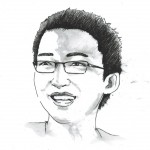I first saw Chen Guangcheng at Mory’s, of all places.
Lunchtime was almost over. A man in a black coat made his way past my table, helped along by a middle-aged woman. The dark shades he wore caught my eye. Noticing my inquisitive glance, the Yale representative leading them beamed at me.
Yes, it’s him, she said.
It was him. Chen Guangcheng, self-taught lawyer, human rights activist, political dissident. Born and raised in a rural village in China’s coastal Shandong province, Chen lost his eyesight to illness at an early age. He first gained a reputation as a fierce advocate for disability rights, but quickly drew the ire of local authorities when he began to represent local women who had suffered from forced abortions. Convicted for “damaging property and organizing a mob to disturb traffic,” Chen was thrown in jail for more than four years, following which he was placed under indefinite house arrest.
Last April, Chen’s story grabbed headlines around the world when he managed to outsmart round-the-clock surveillance and make an improbable escape. After he took refuge in the American embassy in Beijing, the Obama administration launched an inspired diplomatic effort to secure his freedom. In May, Chen and his family boarded a plane for New York. He is currently studying English and law as a visiting scholar at NYU.
Before I met him this weekend, I had known that Chen was going to be in New Haven for the annual Rebellious Lawyering Conference at the Yale Law School. Never one to compromise in his fight against corrupt authorities, Chen may truly be called a “rebel.” The tag was even picked up by GQ magazine, which labeled Chen its “Rebel of the Year” for 2012. The cover photo of the GQ story featured a smartly dressed Chen standing on the deck of a boat. Around his neck was a bright red scarf that flowed brilliantly with the wind.
I thought of that red scarf as I listened to Chen discuss his cause during his Law School panel this weekend. Limited by his lack of English skills and handcuffed by the hindrances of translation, Chen’s passionate indictment of human rights abuses in rural China seemed oddly out of place in a presentation that was singularly focused on telling his personal story.
The panel — which featured Law School professor Harold Koh, heavily involved in the Chen affair in his capacity as legal adviser to the State Department — relished in juicy details of Chen’s daring escape (note: to be featured in his upcoming book) and the ensuing American diplomatic victory against China’s villainous (and seemingly less-than-competent) autocratic regime.
Chen was portrayed as an icon representing the human rights cause in China. Here was one individual, boldly challenging a despotic police state in the name of justice, and who, with the help of freedom-loving Americans, had emerged victorious. Chen’s physical handicap only intensified the intrigue of his story. It’s the stuff of Hollywood movies, and last time I heard, one is already in the works.
Chen is not able to see his lustrous GQ portrait, but he must have felt the red scarf flutter in the wind. He surely understands his image as freedom fighter, his status as international icon for human rights and legal justice. Yet behind those signature dark glasses of his, I wonder what he really thinks about his expanding influence and his move from China to the U.S.
His words are as uncompromising as ever. He spoke of his struggle: “When a rabid dog wants to bite you, it won’t stop if you slow down, nor will it give up if you keep on running. You must turn around and strike it.”
When I asked about his plans for the future, however, his answer seemed vague and rehearsed. “I will continue to do everything in my power to fight injustice in China,” he insisted, “no matter where I am.”
To be fair, Chen is not to blame for the thick political gloss that has come as an inevitable result of his status as a dissident outside of his own country. While his personal plight has certainly drawn more attention to the issue of human rights abuse in China, perhaps there is a point at which too much emphasis on the hero can distract from his cause.
Beneath Chen’s heavily politicized and commodified image lies a brave soul hardened by years of unspeakable persecution. While we should take inspiration from his incredible story, we must focus our attention on the real issue at hand — the millions of people still suffering under China’s unjust legal system today.
Xiuyi Zheng is a junior in Davenport College. His column runs on alternate Mondays. Contact him at xiuyi.zheng@yale.edu.








